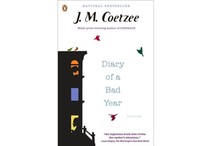Diary of a Bad Year
By J.M. Coetzee
240 pages;
Viking
We are in a period of uneasiness about the novel, about its power to address the complexities of our world. Luckily, there are still geniuses among us, including Nobel laureate J.M. Coetzee, whose Diary of a Bad Year (Viking) is an intricately layered set of narratives that combines the ruinous politics of our moment with the delicate filaments of human relations. Diary focuses on an elderly writer, a South African living in Australia, who has been commissioned by a German publisher to produce a miscellany of opinionated essays about politics and culture. As Coetzee did in Elizabeth Costello (2003), he includes these nonfiction writings as an integral part of the story: Indeed, here they (along with some gorgeous journal entries later in the book) form the main narrative line, a skeleton on which hangs the more fragile materials that are the guts of the story. The old writer (known only as Señor C) is working on these essays, which we see on the top portion of the page, when, in an elliptical narrative that runs simultaneously along the bottom, he meets Anya, a ravishing young woman who lives in his building, and hires her to be his typist. Anya is a kept woman, bored, unemployed, living with a corrupt and cynical older man. Soon her story joins the other two, so the page is divided into three sections. The book becomes a physical challenge to read, yet one doesn't let it go—Coetzee is one of the English-speaking world's great tragic storytellers. His books are about the enormous depths of feeling and longing and nobility that the human is capable of, and the very dark, broken places in which he gets mugged by history, which inevitably sneaks up on him in the night. The effect here is a brilliantly economical, fragmentary revelation of the role that intellect, writing, and love play in the making of a complete, if not entirely effectual, life. Coetzee captures the kindness, the vulnerability, and the desire at his characters' core—what T.S. Eliot once referred to as "some infinitely gentle / infinitely suffering thing"—in a novel that offers exciting formal evidence of a literary artist's capacity to keep up with the chaotic malfunctions of our time.
— Vince Passaro


